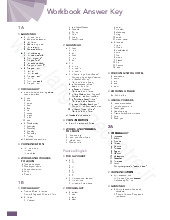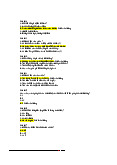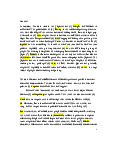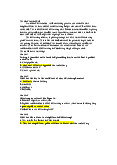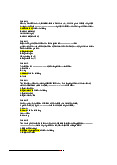






Preview text:
24
Basic IELTS Speaking – IFS Lesson Plan
Part 1: Talking about schools
1) Frequently-asked questions:
1. Which middle school did you study in?
2. Was it close to your home? How did you get to school every day?
3. What did you like the best about that school?
4. Is there anything you didn’t like about your school?
5. If you were the president of the school, what changes would you like to make?
6. What did you think of the teachers there?
2) Useful words and expressions: Conscientious (adj) /ˌkTnʃiˈenʃəs/ Putting a lot of effort into work Cycle (n) [I] /ˈsaɪkl/ To ride a bicycle
Elementary school (n) /ˌelɪˈmentri skuːl/ A school which provides the [C] first part of a child’s education, usually for children between about 6 and 12 years old Facilities (n) [plural] /fəˈsɪləti/ The buildings, equipment and services provided for a particular purpose Far (adj) /fSː(r)/ From a great distance in space or time High school (n) [C] /ˈhaɪ skuːl/ A school in the US for children aged from 14 to 18, or from 12 to 18 if there is also a junior high school; a school in Britain for children aged from 11 to 18
Kindergarten (n) [C or /ˈkɪndəɡSːtn/ The first year of school, for U] children aged 5 Language laboratory /ˈlæŋɡwɪd A room in a school or (n) [C] (language lab) ləbTrətri/ college in which students 24 25 can use equipment to help them practice listening to and speaking a foreign language Middle school (n) [C] /ˈmɪdl skuːl/ A school for children between the ages of about 11 and 14
Nursery school (n) [C] /ˈnɜːsəri skuːl/ A school for children between the ages of 2 and 5 Patient (adj) /ˈpeɪ n ʃ t/ Having patience
Preschool (n) [C or U] /ˈpriːskuːl/ A school for children who are younger than 6 years old Primary (adj) /ˈpraɪməri/ [before noun] (UK and Australian English) of or for the teaching of young children, especially those between 6 and 12 years old Secondary (adj) /ˈsekəndri/ [before noun] relating to the education of children approximately between the ages of 11 and 16 or 18 Sense of Having good judgment on responsibility (n) [U] something that is somebody’s duty to deal with Strict (adj) /strɪkt/ Having definite rules than somebody expects people to obey completely Tube (n) /tjuːb/ Train/underground train Station (n) [C] /ˈsteɪ n ʃ / A building and the surrounding area where buses or trains stop for people to get on or off Bus station (n) [C] /ˈbs steɪ n ʃ / Is a place where many buses start or end their journeys University entrance /ˌjuːnɪˈvɜːsəti An examination which a exam (n) [C] ˈentrəns ɪ ˈ ɡ zæm/ student takes to be 25 26 accepted into a university
3) Useful sentence structures:
1. When I was (age/in + name of school). I used to (infinitive phrase).
Ex: When I was in middle school, I used to study until 10 pm every night.
2. My favourite teacher in (school/college/university) was my
(school subject) teacher, Mr/Mrs. (surname).
Ex: My favourite teacher in university was my History teacher, Mr.Howard.
3. I really liked Mr./Mrs. (surname) because (clause of reason).
Ex: I really liked Mrs.Ursual Nixon because she was very kind to us.
4. My (school/college/university) years were (adjective).
Ex: My high school years were very busy.
5. I spent a lot of time (gerund phrase).
Ex: I spent a lot of time studying for exams.
6. (subject/major) was my (least) favourite subject.
Ex: Maths was my least favourite subject.
7. My school is/was located (prepositional phrase/location).
Ex: My school is located right behind my house.
4) Use the suggested phrase below to make statements about schools:
1. When I was/ senior middle school/ used to/ hate Mathematics class.
2. My favourite teacher/ high school/ my Chemistry teacher/ Mr.Turner.
3. I really liked/ Mr.Turner/ he made classes interesting.
4. My elementary school years/ very carefree. 26 27
5. I spent a lot of time/ doing homework and helping my classmates with their questions.
6. Physics/ least favourite subject.
7. My school/ located/ two blocks away from my parents’ house.
8. My high school years/ especially the last year/ very difficult and busy.
9. When I was/ late for class/ used to/ get a stern warning from my teacher. 10.
Favourite teacher/ elementary school/ second grade teacher/ Mr.Ross.
Part 2: Decribing places
1) Cue card and sample:
Describe a garden/park you enjoyed visiting. You should say: Where it is What it looks like When you first visited it
And explain how you enjoyed the visit.
I really like to visit this park which is not too far from my home. It’s
located behind the Rodale Hotel and just east of the Lido Hotel. It’s
called the Lido Park. You can either enter the park through the west gate or the east gate. 27 28
The park is really beautiful. It’s got quite a few areas and it is very
peaceful. There are pathways all around the park and a lot of grass
and trees. There are two ponds – a small one where you can try to
fish for goldfish in the summer time, and a very large pond where you
can go skating in the winter time.
Near the large pond is a picnic area where you can sit down and
relax. It’s nice and shady because there are many tall trees nearby.
There’s also a play area for small children with games and rides, a
restaurant and a snack bar, and an indoor swimming pool.
I first found a park a few years ago after a friend told me about it. I
went to see it for myself, but it was actually a bit hard to find the way
to get in because the entrances were not very prominently marked.
When I first went there, I was pleasantly surprised at how large the
park was. There were so many different parts of it – the small pond,
the large pond, the children’s area, the swimming area, and some
other grassy areas where children could play. I just walked along the
pathways to get an idea of what the park was like.
My first visit to the Lido Park made me want to return again and
again. I even thought about buying a monthly pass instead of buying a
single ticket each time. Actually, I didn’t buy the monthly pass
because I knew I wouldn’t be able to visit the park as often as I would
like to. I love going to the Lido Park because it makes me feel relaxed
and happy. It’s so peaceful to walk along the paths or just sit down by
the large pond and think. I like to watch the children playing in the
children’s area, because they are so excited and energetic. It’s a nice
break from city life. I usually go to the Lido Park whenever I feel like I
need some space to unwind and think.
2) Useful words and expressions: Attractive (adj) /əˈtræktɪv/ Very pleasing in appearance Brochure (n) [C] /ˈbrəʊʃə(r)/ A type of small magazine that 28 29 contains pictures and information on a product or a company Bustling (adj) /ˈbslɪŋ/ Full of busy activity Cosy (adj) /ˈkəʊzi/ Comfortable and pleasant, especially (of a building) because of being small and warm Destination (n) [C] /ˌdestɪˈneɪ n ʃ / The place where someone is going to Architecture (n) /ˈSːkɪtektʃə(r)/ The art and science of designing and making buildings Heart of the city (n) The central of most important part of a town Homely (adj) /ˈhəʊmli/ Plain or ordinary, but pleasant Industrial (adj) /ɪnˈdstriəl/ Related to industry Lively (adj) /ˈlaɪvli/ Full of people who are busy or who are enjoying themselves Messy (adj) /ˈmesi/ Untidy and dirty Pace of life (n) [U] /peɪs əv laɪf/ The speed of life Packed (adj) (with sth) /pækt/ Completely full Peaceful (adj) /ˈpiːsfl/ Quiet and calm Scenic (adj) /ˈsiːnɪk/ (natural features) beautiful Shabby (adj) /ˈʃæbi/ Old and in bad condition Skyscraper (n) [C] /ˈskaɪskreɪpə(r)/ A very tall modern building, usually in a city 29 30 Spacious (adj) /ˈspeɪʃəs/ Large and with a lot of space Tidy (adj) /ˈtaɪdi/ Ordered and arranged in the right place Warm atmosphere (n) /wɔːm ˈætməsfɪ (r ə )/ Friendly and loving [C or U] character or feeling of a place/situation
3) Useful sentence structures:
1. It looked (adjective) when I first visited it in (time expression).
Ex: It looked peaceful when I first visited it in the summer of 2005.
2. It is the place where I (verb phrase).
Ex: It is the place where I first met my boyfriend.
3. The reason why I am attracted to it so much is because (clause)/
because of (phrase of reason).
Ex: The reason why I am attracted to it so much is because of the
traditional houses along the river.
4. The place which gives me fond memories is (noun phrase).
Ex: The place which gives me fond memories is the garden in front of Jim’s house.
5. I am highly impressed by (noun phrase).
Ex: I am highly impressed by the natural beauty of the beaches. 30
